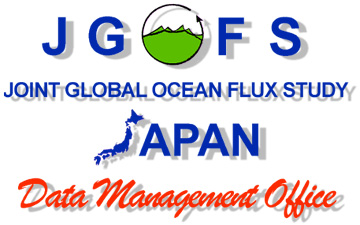
The Joint Global Ocean Flux Study (JGOFS) was organized under the auspices of the International Council for Science (ICSU) together with the Scientific Committee on Oceanic Research (SCOR). It became a Core Project of the International Geosphere-Biosphere Programme (IGBP) in 1990. Close to 20 countries were contributing to JGOFS planning or field work. The following two scientific goals of the JGOFS were stated in its Science Plan (SCOR 1990):
- Goal 1
- To determine and understand the processes controlling the time-varying fluxes of carbon and associated biogenics elements in the ocean on a global scale, and to evaluate the related exchanges with the atmosphere, sea floor and continental boundaries.
- Goal 2
- To develop a capability to predict the response of oceanic biogeochemical processes to anthropogenic perturbations on a global scale, in particular those related to climatechange.
The fieldwork for most Process Studies of JGOFS were completed in 1998, and then JGOFS was completed in 2003, the year in which it held its final Open Science Conference in Washington D.C after the integrating regional synthesis and modelling activities, for maintaining links to other ocean observing and global change programmes, and for leading the global synthesis and modelling phase.
Role of JODC as JGOFS Japan Data Management Office
Japan also jointed the project from the early phase of its planning.
An integrated field study on carbon fluxes in the North Pacific was carried out from 1991
under the project "Ocean Fluxes: their Role in the Geosphere and Biosphere" supported by the Ministry of Education, Science and Culture.
Furthermore a number of projects on carbon cycling in the Pacific were undertaken by various organizations in Japan.
During the course of the years a huge volume of data and information were accumulated
and the need was felt for an efficient body that could organise the data and facilitate its exchange among scientists
with common interests. Working in cooperation with the international JGOFS this group could also serve as a means
for exchange of international data and information.
A working group on JGOFS data management was established in December 1992 within the National Committee for JGOFS under the Japan Science Council.
A recommendation was presented by the working group to the Committee and it was endorsed in February 1993.
The working of the Data Management Office can be broadly divided into the following divisions:
- Data Management Scheme
- Data Policy
- JGOFS data categories and time period of submission and release of data
- Protocols for JGOFS
JGOFS Data Recourses
JGOFS International Collection DVD. Volume 1: discrete datasets (May 2003)
This Datasets is an assembly of existing datasets produced by member countries participating in JGOFS. It was edited by the Data Management Task Team members of JGOFS, with the help of the IPO Assistant Executive Officer, and distributed during the final JGOFS Open Science Conference in May 2003. The main distributor is the World Data Center A for Oceanography.
JGOFS North Pacific Process Study Data Set (Sep. 2004)
This Data Set is comprised of JGOFS data sets obtained during the JGOFS North Pacific Process Study (NPPS) as well as the JGOFS related data sets in the North Pacific. All of these datasets were used in the JGOFS Synthesis Study following the NPPS field programs. The NPTT/NPSG was discussed about the production of the data set resulting from the NPPS, mainly to establish a basis for the future biogeochemical studies in the North Pacific as a legacy of the JGOFS NPPS. This data set was published by JODC, hosting the JGOFS Japan Data Management Office.
| JODC TOP |
|---|
If you have any questions or comments, please do not hesitate to contact us at:
jodc(a)jodc.go.jp
Last update : July 1, 2009